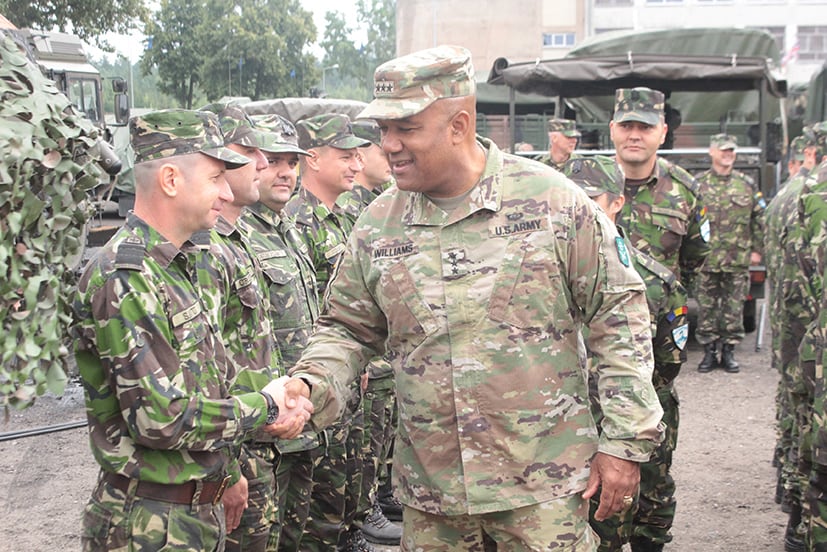A year after NATO leaders agreed to increase their forces on the eastern edge of Europe, multiple battle groups are in place in Poland, Latvia, Lithuania and Estonia.
Lt. Gen. Darryl Williams, commander of the Allied Land Command, told attendees at the Association of the U.S. Army Annual Meeting & Exposition that moving those soldiers that quickly wasn’t without its challenges but many problems were solved at the small unit leader level.
Based out of Turkey, Williams coordinates NATO land forces with a staff of 350. Following NATO and non-NATO exercises this summer, four battle groups remain in place: 1,100 soldiers in Estonia; 1,138 soldiers in Latvia; 1,022 in Lithuania; and 1,270 in Poland.
Each of those battle groups contains a mix of forces. One such group, the Latvian group, headed in part by Canadian Lt. Col. Wade Rutland, had six nations contributing 60 pieces of heavy equipment, from light armored vehicles to tanks and artillery pieces.
The mixed force required some cohesion, Rutland said. Not everyone spoke English, some didn’t recognize their allies’ vehicles.
Throughout the Zapad, massive military exercises performed in September by Russia in and around Belarus near the Baltics, each of the battle groups continued daily exercises.
Asked by an audience member whether he was surprised by anything he observed during the Russian exercise, Williams was blunt: “No.”
He and his colleagues have been watching the Russians for a long time. He’s been at the post since 2016 but previously served in Europe in other commands.
What was different this time was having equipped, multi-national forces in place and in strength for the first time since the end of the Cold War.
Williams called the decision by NATO powers in 2016 to reinforce the eastern edges of Europe a “watershed” moment that responded to a threat his Baltic allies have recognized for a long time.
Capt. Brage Reinaas, who commanded a company in the Lithuania formation, emphasized taking advantage of the preparation time and joint training.
“As the situation is right now, no one is trying to kill you, so you have to spend your time wisely,” Reinaas said.
Todd South has written about crime, courts, government and the military for multiple publications since 2004 and was named a 2014 Pulitzer finalist for a co-written project on witness intimidation. Todd is a Marine veteran of the Iraq War.





